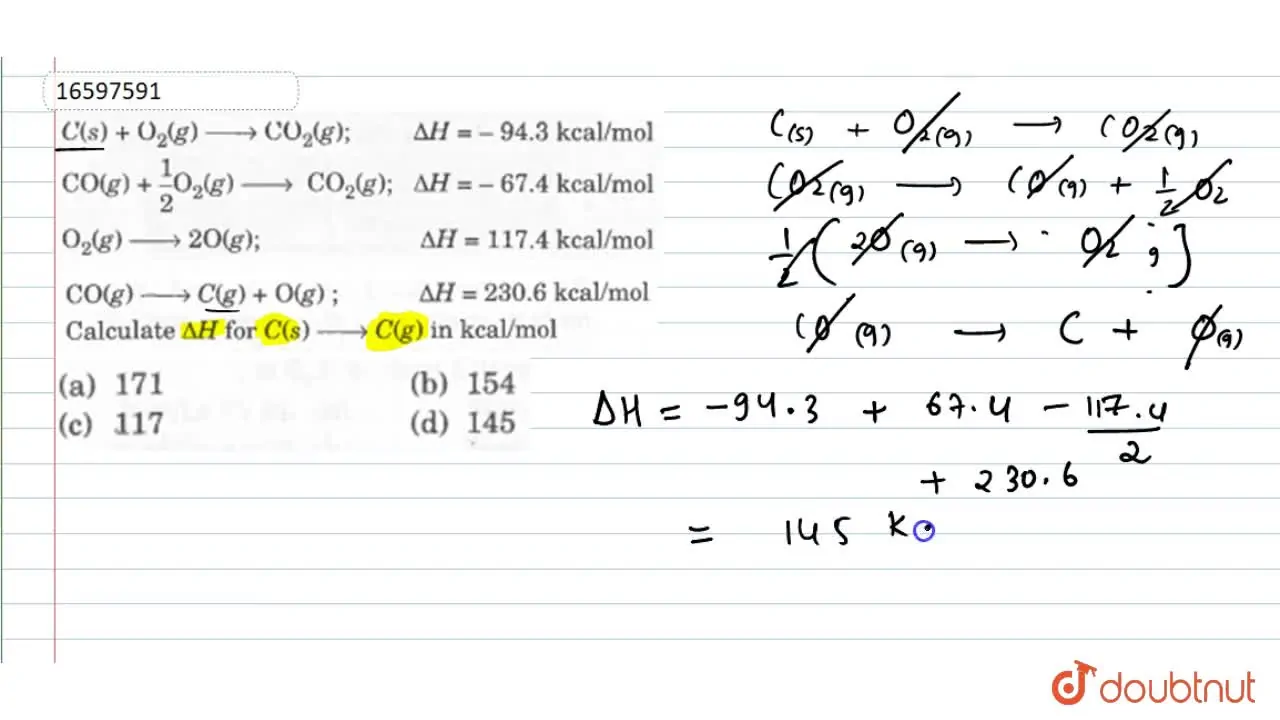C(s)+O2(g)→CO2(g), ΔH=−94.3kcal/mol
CO(g)+12O2(g)→CO2(g), ΔH=−67.4kcal/mol
O2(g)→2O(g), ΔH=117.4kcal/mol
CO(g)→C(g)+O(g), ΔH=230.6kcal/mol
Calculate ΔH for C(s)→C(g) in kcal/mol
171
154
117
145
The correct Answer is:D
Step by step video, text & image solution for C(s)+O_(2)(g)toCO_(2)(g)," "DeltaH=-94.3 kcal//mol CO(g)+(1)/(2)O_(2)(g)toCO_(2)(g)," "DeltaH=-67.4 kcal//mol O_(2)(g)to2O(g)," "DeltaH=117.4 kcal//mol CO(g)toC(g)+O(g)," "DeltaH=230.6 kcal//mol Calculate DeltaH for C(s)toC(g) in kcal//mol by Chemistry experts to help you in doubts & scoring excellent marks in Class 11 exams.
Related Playlists
Similar Questions
C(s)+O2(g)→CO2(g)ΔH=−94.3kcal/molCO(g)+12O2(g)→CO2(g)ΔH=−67.4kcal/molO2(g)→2O(g)ΔH=117.4kcal/molCO(g)→C(g)+O(g)ΔH=230.6kcal/mol
Calculate ΔH for C(s)→C(g) in kcal/mol.View SolutionC(s)+O2(g)→CO2(g),ΔH=−94 kcal
2CO(g)+O2→2CO2,ΔH=−135.2 kcal
The heat of formation of CO(g) isView SolutionC(s)+O2(g)→CO2(g),ΔH=−94 kcal
2CO(g)+O2→2CO2,ΔH=−135.2 kcal
The heat of formation of CO(g) isView SolutionSrhombic+O2(g)→SO2(g),ΔH=−297.5kcal
Smonoclinic+O2(g)→SO2(g),ΔH=−300kJView SolutionC(graphite)+O2(g)→CO2(g),ΔH=−94.05kcalmol−1
C(diamond)+O2(g)→CO2(g),ΔH=−94.50kcalmol−1 thereforeView SolutionIf C(s)+O2(g)→CO2(g),ΔH=randCO(g)+12O2→CO2(g),ΔH=s then, the heat of formation of CO is
View SolutionIf C(s)+O2(g)→CO2(g),ΔH=X and CO(g)+1/2O2(g)→CO2(g),ΔH=Y, then the heat of formation of CO is
View SolutionGiven
C(s)+O2(g)→CO2(g), ΔH=−395kJ
S(s)+O2(g)→SO2(g), ΔH=−295kJ
CS2(l)+3O2(g)→CO2(g)+2SO2(g), ΔH=−1110kJ
The heat of formation of CS2(l) isView Solutiongiven NO(g)+O3(g)→NO2(g)+O2(g) ΔH=198.9kJ/mol
O3(g)→3/2O2(g) ΔH=−142.3kj/mol
O2(g)→2O(g) ΔH=+495.0kj/mol
The entalpy change (ΔH) for the following reaction is
NO(g)+O(g)→NO2(g)View SolutionGiven that:
i. C(s)+O2(g)→CO2(g),ΔH=−94.05kcal
ii. H2(g)+12O2(g)→H2O(l),ΔH=−68.32kcal
iii. C2H2(g)+52O2(g)→2CO2(g)+H2O(l),ΔH=−310.62kcal
The heat of formation fo acetylene isView Solution


